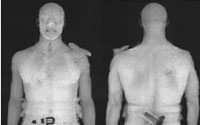US Airports Personnel Get Ready To Enjoy the View of Naked Passengers
From now on, the US plane passengers will be "undressed." Special services obtained equipment that will scan passengers, checking them under the clothes. Airports personnel believe that this measure would help to prevent terrorist attacks and speed up security control.

The innovation was caused by an attempt of a terroristic attack on board of Northwest Flight 253 as it prepared to land in Detroit on Christmas Day. A 23-year-old Nigerian man Umar Farouk Abdulmutallab allegedly linked to al Qaeda brought a bomb to the plane in his underwear.
Only courage of the passenger sitting next to the terrorist helped to prevent a tragedy.
President Barack Obama called for new scrutiny of screening policies and technologies.
Now passengers will have to go through scanning so security could see they are not hiding anything underneath their clothes. Theoretically, the procedure may speed up security control as passengers will not have to take off shoes, belts, and outwear.
Americans have already equipped 20 airports with the scanners. In 2010, new scanners are expected to be installed in all airports of the US and Great Britain. In England, scanners were installed in Manchester and Heathrow back on October.
Germany is ready to follow the trend. Representatives of the governing coalition paid attention to the statement made by Konrad Freiberg, the chairman of the GdP police union who said that "Cheap flights are at the expense of security. Airport operators and airlines often work for minimal wages and save on personnel."
However, according to Rheinische Post, the officials will give the green light to the scanners provided the manufacturers will ensure protection of the “intimate sphere” of the passengers and will not let scanned images become available to the public.
The developers of the technology and representatives of the airports ready to use the scanners assure that radiation from the scanners is minimal and is not hazardous for health. A passenger can go through the scanner five thousand times a year without harmful consequences.
The scanners are widely criticized in the US. Representatives of the Consumer Protection society compare the scanners to “virtual strip search.”
Nude scanners specialists explain that the scanners software uses algorithms that analyze human contour without paying attention to intimate parts which could have been considered invasion of privacy. The faces of the scanned passengers will be blurred, and the images will be deleted immediately.
British newspaper The Guardian wrote about the scanners describing the machines in Manchester airport that allow seeing all details, including prosthetic limbs, silicon breasts, piercing, etc. The article discussed a possibility of airport employees keeping the nude images to make money on them later. The issue of privacy is still very acute.
Boris Pushkarev, a Russian residing in the US, told Pravda.ru that puritan Americans are screaming about the privacy issues. “Of course, the US courts are independent and may want to represent those who would file law suits because of unwillingness to appear naked before strangers. But if the procedure is implemented as an anti-terror action, even court would not be able to protect the passengers,” he said.
“The scanners were first installed over two years ago, both in airports and federal courts. The measure was introduced on a voluntary basis, but now it seems that scanning will be mandatory.
It could be that the manufacturers took advantage of the situation to make profit. A minimum price of a scanner is $125,000. At least 150 airports will be equipped with the scanners. We are talking about millions of dollars in profits.”
Sergey Balmasov
Pravda.Ru
Subscribe to Pravda.Ru Telegram channel, Facebook, RSS!





